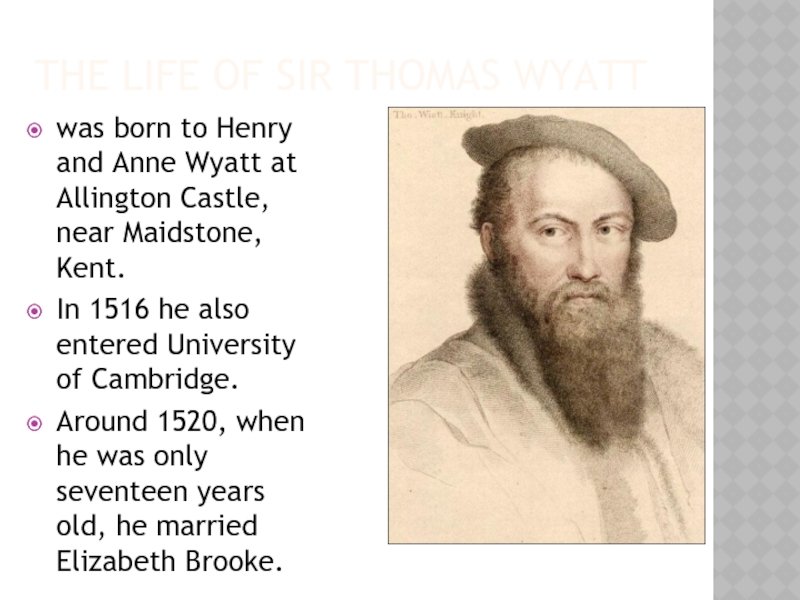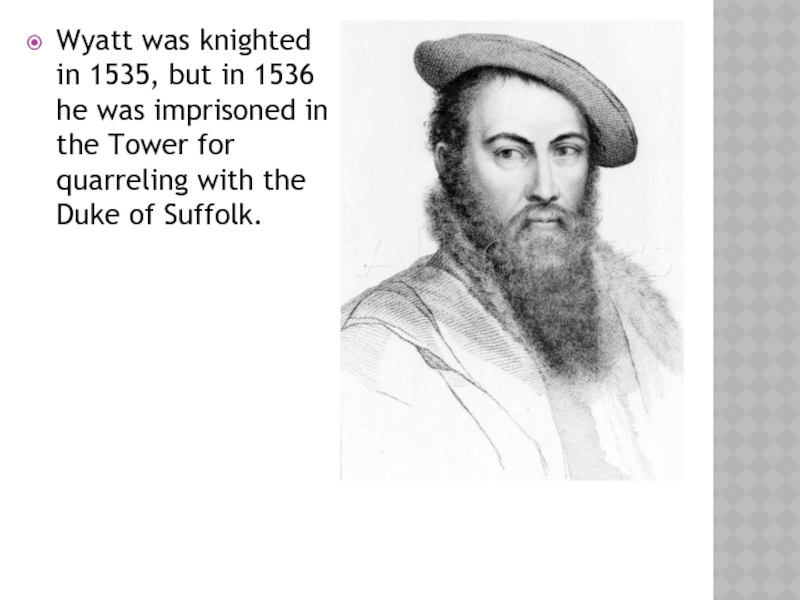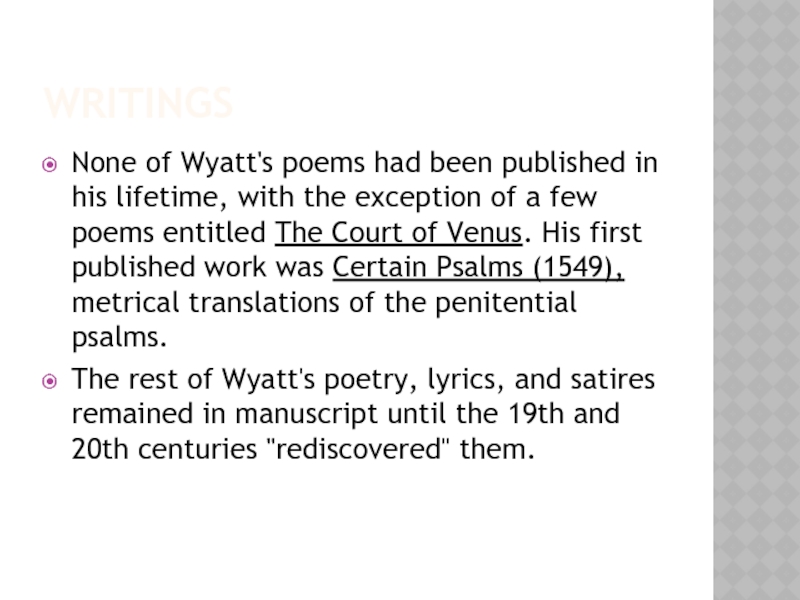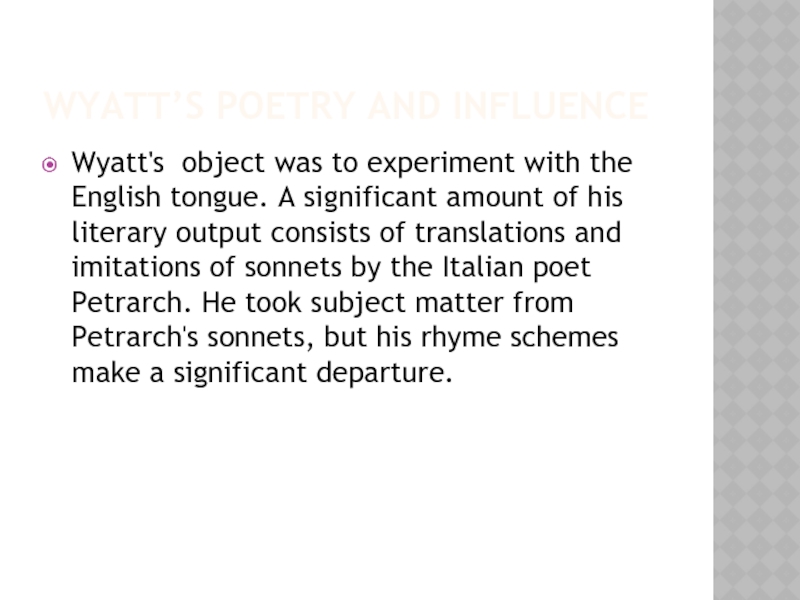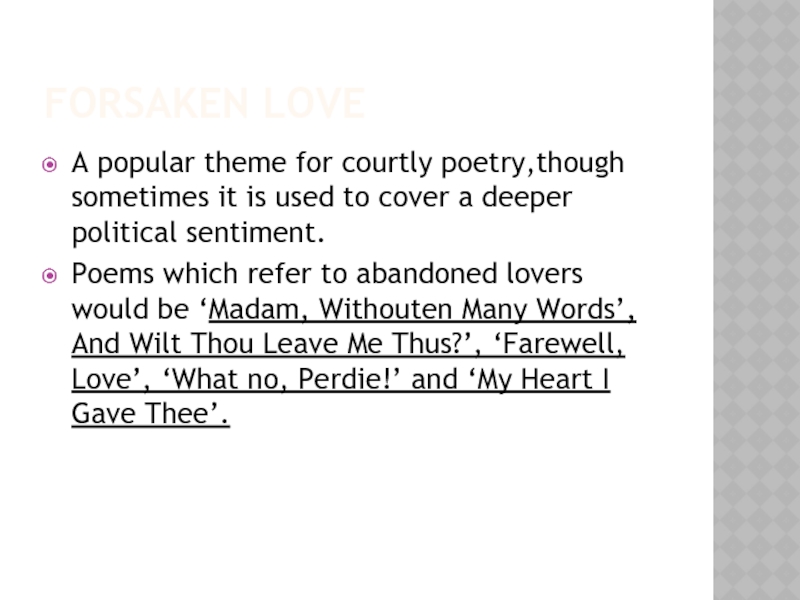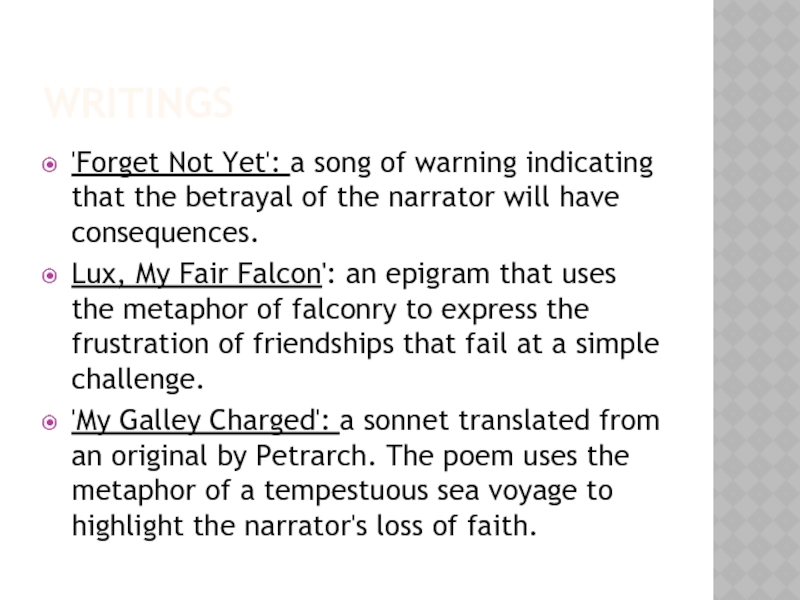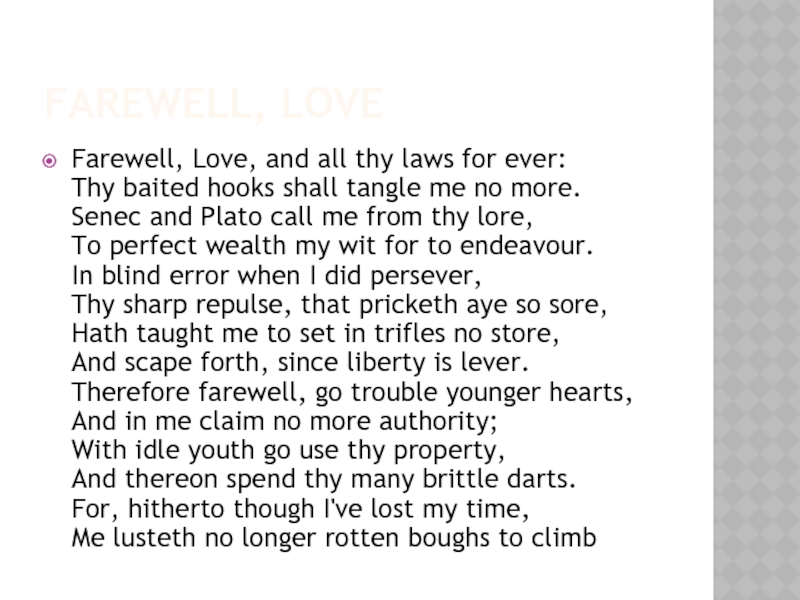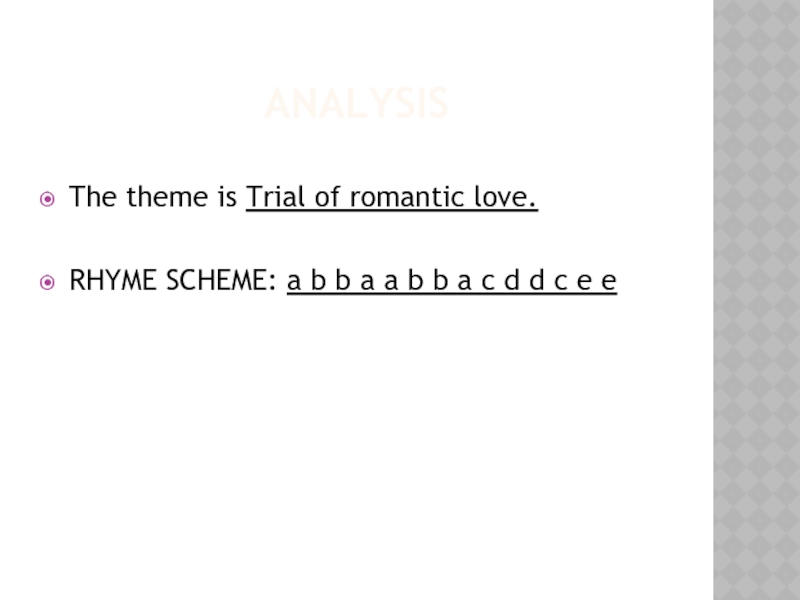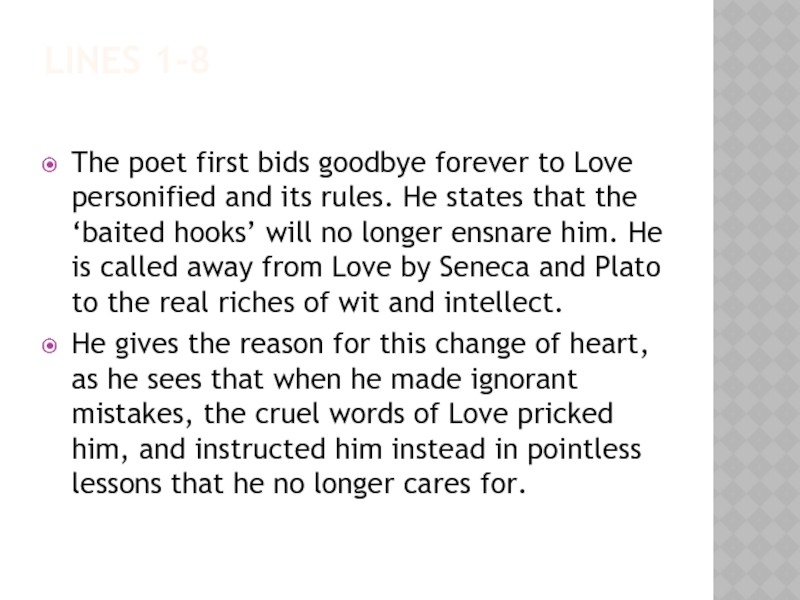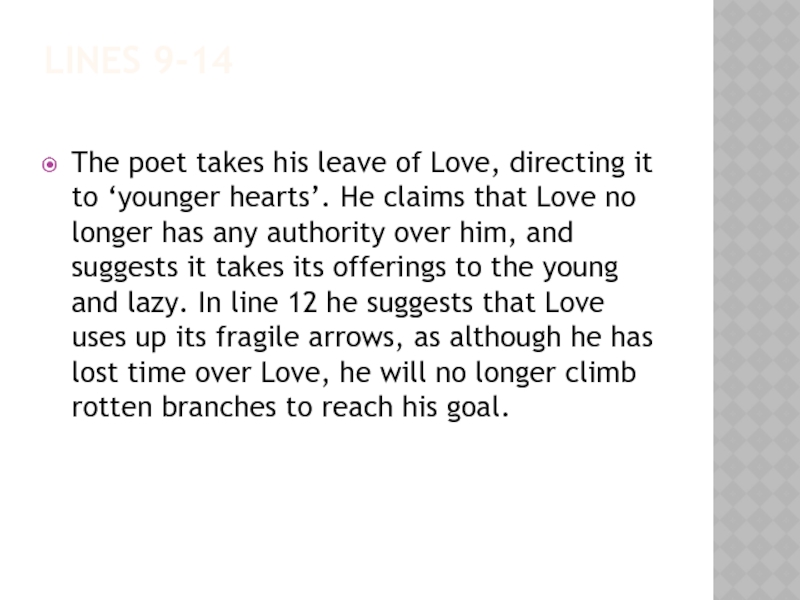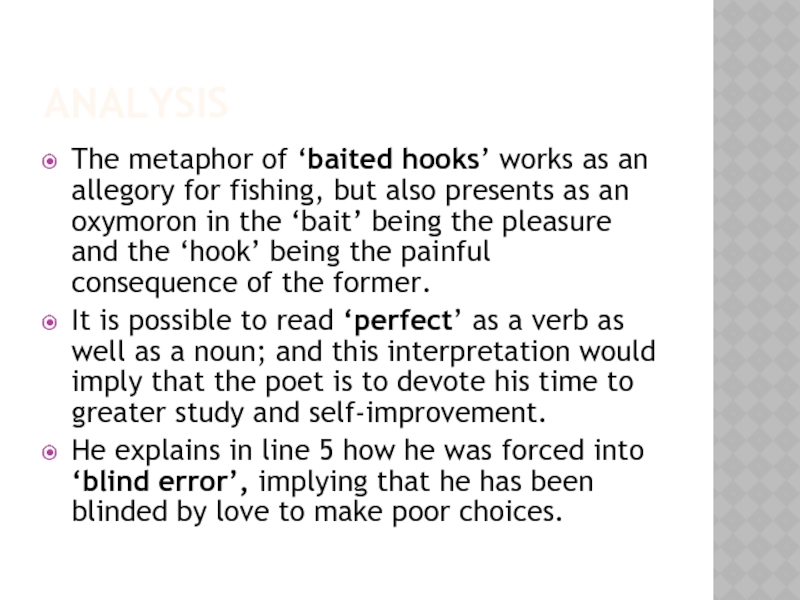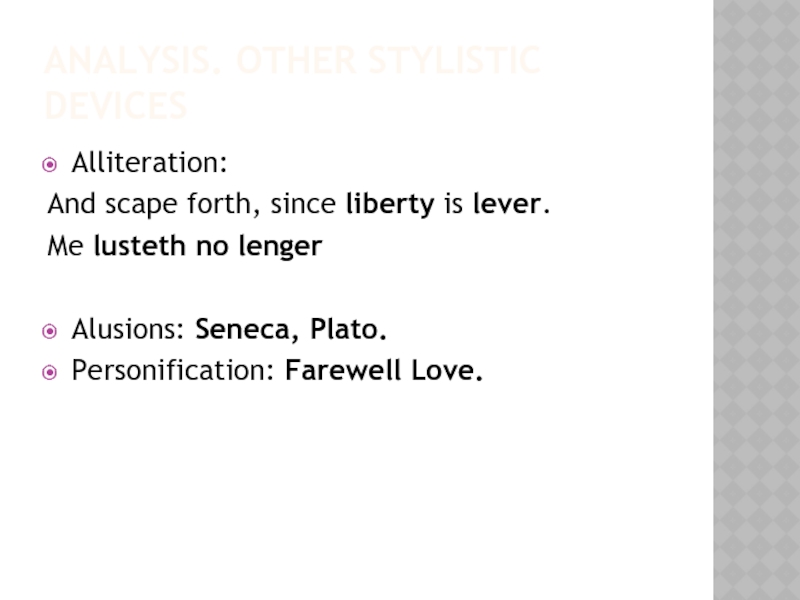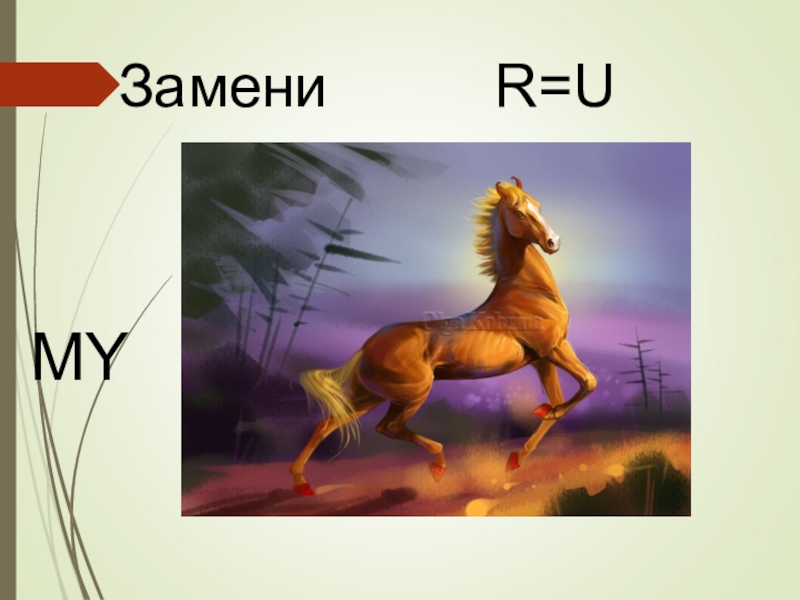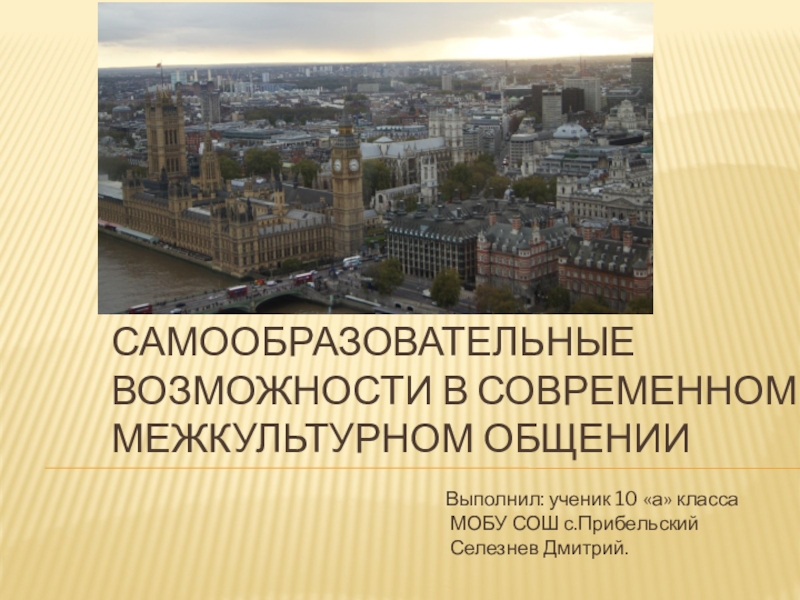- Главная
- Разное
- Образование
- Спорт
- Естествознание
- Природоведение
- Религиоведение
- Французский язык
- Черчение
- Английский язык
- Астрономия
- Алгебра
- Биология
- География
- Геометрия
- Детские презентации
- Информатика
- История
- Литература
- Математика
- Музыка
- МХК
- Немецкий язык
- ОБЖ
- Обществознание
- Окружающий мир
- Педагогика
- Русский язык
- Технология
- Физика
- Философия
- Химия
- Шаблоны, фоны, картинки для презентаций
- Экология
- Экономика
Презентация, доклад на английском языке Sir Thomas Wyatt
Содержание
- 1. Презентация на английском языке Sir Thomas Wyatt
- 2. The Life of Sir Thomas Wyattwas born
- 3. Wyatt was knighted in 1535, but in
- 4. WritingsNone of Wyatt's poems had been published
- 5. Wyatt’s Poetry and Influence Wyatt's object was
- 6. Forsaken Love A popular theme for courtly
- 7. Writings'Forget Not Yet': a song of warning
- 8. Farewell, LoveFarewell, Love, and all thy laws
- 9. AnalysisThe theme is Trial of romantic love.RHYME
- 10. Lines 1-8 The poet first bids goodbye
- 11. Lines 9-14 The poet takes his leave
- 12. AnalysisThe metaphor of ‘baited hooks’ works as
- 13. Analysis. Other stylistic DevicesAlliteration:And scape forth, since liberty is lever.Me lusteth no lengerAlusions: Seneca, Plato.Personification: Farewell Love.
The Life of Sir Thomas Wyattwas born to Henry and Anne Wyatt at Allington Castle, near Maidstone, Kent.In 1516 he also entered University of Cambridge. Around 1520, when he was only seventeen years old, he married
Слайд 2The Life of Sir Thomas Wyatt
was born to Henry and Anne
Wyatt at Allington Castle, near Maidstone, Kent.
In 1516 he also entered University of Cambridge.
Around 1520, when he was only seventeen years old, he married Elizabeth Brooke.
In 1516 he also entered University of Cambridge.
Around 1520, when he was only seventeen years old, he married Elizabeth Brooke.
Слайд 3Wyatt was knighted in 1535, but in 1536 he was imprisoned
in the Tower for quarreling with the Duke of Suffolk.
Слайд 4Writings
None of Wyatt's poems had been published in his lifetime, with
the exception of a few poems entitled The Court of Venus. His first published work was Certain Psalms (1549), metrical translations of the penitential psalms.
The rest of Wyatt's poetry, lyrics, and satires remained in manuscript until the 19th and 20th centuries "rediscovered" them.
The rest of Wyatt's poetry, lyrics, and satires remained in manuscript until the 19th and 20th centuries "rediscovered" them.
Слайд 5Wyatt’s Poetry and Influence
Wyatt's object was to experiment with the
English tongue. A significant amount of his literary output consists of translations and imitations of sonnets by the Italian poet Petrarch. He took subject matter from Petrarch's sonnets, but his rhyme schemes make a significant departure.
Слайд 6Forsaken Love
A popular theme for courtly poetry,though sometimes it is
used to cover a deeper political sentiment.
Poems which refer to abandoned lovers would be ‘Madam, Withouten Many Words’, And Wilt Thou Leave Me Thus?’, ‘Farewell, Love’, ‘What no, Perdie!’ and ‘My Heart I Gave Thee’.
Poems which refer to abandoned lovers would be ‘Madam, Withouten Many Words’, And Wilt Thou Leave Me Thus?’, ‘Farewell, Love’, ‘What no, Perdie!’ and ‘My Heart I Gave Thee’.
Слайд 7Writings
'Forget Not Yet': a song of warning indicating that the betrayal
of the narrator will have consequences.
Lux, My Fair Falcon': an epigram that uses the metaphor of falconry to express the frustration of friendships that fail at a simple challenge.
'My Galley Charged': a sonnet translated from an original by Petrarch. The poem uses the metaphor of a tempestuous sea voyage to highlight the narrator's loss of faith.
Lux, My Fair Falcon': an epigram that uses the metaphor of falconry to express the frustration of friendships that fail at a simple challenge.
'My Galley Charged': a sonnet translated from an original by Petrarch. The poem uses the metaphor of a tempestuous sea voyage to highlight the narrator's loss of faith.
Слайд 8Farewell, Love
Farewell, Love, and all thy laws for ever:
Thy baited hooks
shall tangle me no more.
Senec and Plato call me from thy lore,
To perfect wealth my wit for to endeavour.
In blind error when I did persever,
Thy sharp repulse, that pricketh aye so sore,
Hath taught me to set in trifles no store,
And scape forth, since liberty is lever.
Therefore farewell, go trouble younger hearts,
And in me claim no more authority;
With idle youth go use thy property,
And thereon spend thy many brittle darts.
For, hitherto though I've lost my time,
Me lusteth no longer rotten boughs to climb
Слайд 10Lines 1-8
The poet first bids goodbye forever to Love personified and
its rules. He states that the ‘baited hooks’ will no longer ensnare him. He is called away from Love by Seneca and Plato to the real riches of wit and intellect.
He gives the reason for this change of heart, as he sees that when he made ignorant mistakes, the cruel words of Love pricked him, and instructed him instead in pointless lessons that he no longer cares for.
He gives the reason for this change of heart, as he sees that when he made ignorant mistakes, the cruel words of Love pricked him, and instructed him instead in pointless lessons that he no longer cares for.
Слайд 11Lines 9-14
The poet takes his leave of Love, directing it to
‘younger hearts’. He claims that Love no longer has any authority over him, and suggests it takes its offerings to the young and lazy. In line 12 he suggests that Love uses up its fragile arrows, as although he has lost time over Love, he will no longer climb rotten branches to reach his goal.
Слайд 12Analysis
The metaphor of ‘baited hooks’ works as an allegory for fishing,
but also presents as an oxymoron in the ‘bait’ being the pleasure and the ‘hook’ being the painful consequence of the former.
It is possible to read ‘perfect’ as a verb as well as a noun; and this interpretation would imply that the poet is to devote his time to greater study and self-improvement.
He explains in line 5 how he was forced into ‘blind error’, implying that he has been blinded by love to make poor choices.
It is possible to read ‘perfect’ as a verb as well as a noun; and this interpretation would imply that the poet is to devote his time to greater study and self-improvement.
He explains in line 5 how he was forced into ‘blind error’, implying that he has been blinded by love to make poor choices.
Слайд 13Analysis. Other stylistic Devices
Alliteration:
And scape forth, since liberty is lever.
Me lusteth no lenger
Alusions: Seneca,
Plato.
Personification: Farewell Love.
Personification: Farewell Love.

